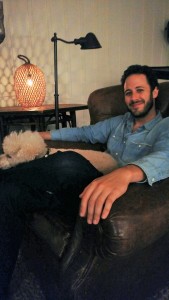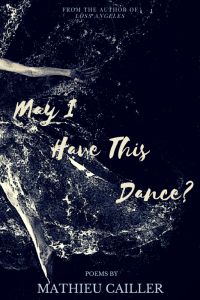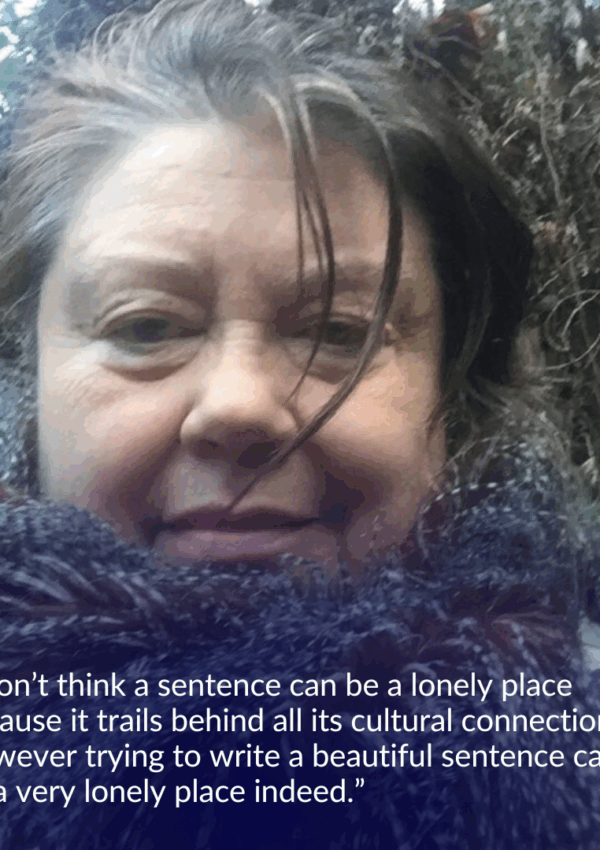An interview by Alicia Cole.
 Mathieu Cailler’s poetry and prose have been widely featured in numerous national and international publications, including the Los Angeles Times and The Saturday Evening Post. A graduate of the Vermont College of Fine Arts, he is the recipient of a Short Story America Prize for Short Fiction and a Shakespeare Award for Poetry. He is the author of Clotheslines (Red Bird Press), Shhh (ELJ Publications), and Loss Angeles (Short Story America Press), which has been honored by the Hollywood, New York, London, Paris, Best Book, and International Book Awards. His poetry collection, May I Have This Dance? (Black Magic Media), is slated for publication in December of 2017 and has already been praised by the New York Book Festival: “Mathieu Cailler is a fresh and fascinating voice on the poetry scene, painting compelling pictures of our world and the human condition.” –Bruce Haring, Director of the New York Book Festival. For more information, please visit www.mathieucailler.com.
Mathieu Cailler’s poetry and prose have been widely featured in numerous national and international publications, including the Los Angeles Times and The Saturday Evening Post. A graduate of the Vermont College of Fine Arts, he is the recipient of a Short Story America Prize for Short Fiction and a Shakespeare Award for Poetry. He is the author of Clotheslines (Red Bird Press), Shhh (ELJ Publications), and Loss Angeles (Short Story America Press), which has been honored by the Hollywood, New York, London, Paris, Best Book, and International Book Awards. His poetry collection, May I Have This Dance? (Black Magic Media), is slated for publication in December of 2017 and has already been praised by the New York Book Festival: “Mathieu Cailler is a fresh and fascinating voice on the poetry scene, painting compelling pictures of our world and the human condition.” –Bruce Haring, Director of the New York Book Festival. For more information, please visit www.mathieucailler.com.
Black Fox Literary Magazine: What first drew you to poetry?
Mathieu Cailler: I love the idea of making micro moments—images, flashes—the stars of a piece. In fiction, there’s much poetry in the prose, but it’s often buried in paragraphs, and it’s not given its proper space to shine. A character, a little girl perhaps, might blow bubbles across a busy intersection in a novel, and it might be a lovely scene, but in a poem—it’s all about her and the bubbles and how they mix with her world.
It’s freeing not to have to work around plot. I find that poetry allows me to recapture my love of language and words. It’s the atom of everything literary.
BFLM: Who are your inspirations?
MC: My inspiration list looks like a scroll from ancient Greece, but a few are Raymond Carver, Pablo Neruda, Langston Hughes, Sharon Olds, Brigit Pegeen Kelly, Jim Harrison, Bukowski, Frida, Lee Krasner, Nina Simone, Grace Paley, Whitman, Baudelaire, Angelou, Tupac, Nas, and Chekhov.
But, to be honest, inspiration for me just comes from people who are putting in work, quietly, day after day, in their studios, on their stages, dance floors, or at their desks. I love the idea of blank canvases, blank pages, blank musical sheets… coming to life with daily work.
BFLM: Your book May I Have This Dance? is organized into three parts: Waltz, Tango, and Swing. How did you develop this concept?
 MC: I was reading a book of poems by Rumi…another inspiration…and came across a brilliant line: “Dance when you’re broken open. Dance if you’ve torn the bandage off. Dance in the middle of the fighting. Dance in your blood. Dance when you’re perfectly free.”
MC: I was reading a book of poems by Rumi…another inspiration…and came across a brilliant line: “Dance when you’re broken open. Dance if you’ve torn the bandage off. Dance in the middle of the fighting. Dance in your blood. Dance when you’re perfectly free.”
I immediately thought it would make a great epigraph for my poetry collection, which was untitled at the time. I thought about dances, and my poems, and I realized I had some dark poems, some love poems, and some fun poems, so I decided to break them up into three separate sections: waltz for darker pieces, tango for love ones, and swing for fun musings.
BFLM: Do you have standout poems in each section that define the dances?
MC: I wouldn’t say there’s one poem in each section that defines the dances. It’s more of a dance of words. There’s a rhythm and cadence to poetry that’s akin to dance, I think.
BFLM: Your poem “Pangea” really epitomizes the ache of the entire collection. How does your poetry, and poetry in general, help us be “pressed back together again”?
MC: Thank you. I hope that resonates with readers. I think there’s a gentle optimism to poetry because it rips off life’s sheen and forces us to look at the bigger picture. Also, I think everyone can “see” in poetry, but it’s a muscle that not everyone chooses to strengthen. I think of Pangea a lot, actually—all of the continents mashed together. What would our world be if we were still tight and together? In poetry, as with all the arts, it’s the questions that ring loudest.
BFLM: Your work runs the gamut of life experiences. Speak a little bit about your recurrent themes: life, death, the humdrum and ecstatic ecstasies, the little moments, the interruptions, the sparks. What do these say to you?
MC: It’s exactly what I try to convey. Poetry is exactly that. It’s everything. It’s micro and macro. It’s hangnails and the Big Bang and everything in between. That’s what makes it so scary and fun. Just the other day, I wrote a poem about freeways and then one about God.
BFLM: What other projects do you have completed or in the works?
MC: I’ve just wrapped up a novel that needs a good amount of work, and I’m looking to finish it by year’s end. I also just finished another poetry collection and another short-story collection. There’s a novella in my mind that needs to be fleshed out, and I think it will be soon enough. It’s pestering me, and it’s calling me. So when that happens, I have to listen. It will be different from anything I’ve ever written, and that excites me. I am a much better, kinder person when I write, so I do it a lot.
BFLM: If you could have three books with you, what would they be and why?
MC: Do I have to answer this? [Laughs] I would say the short-story collection, What We Talk About When We Talk About Love by Raymond Carver because I learn so much from him every time I read his words. Frida Kahlo’s diary because it makes me dream, and The Little Prince because it always makes me feel like a kid.



Such a great interview. Loved it. Look forward to this poetry collection so much. I adored Loss Angeles!